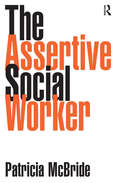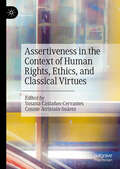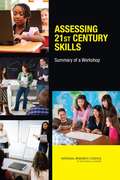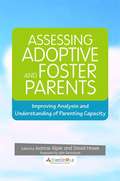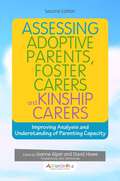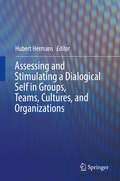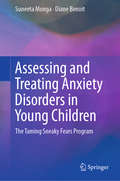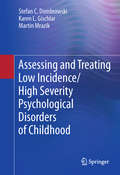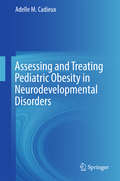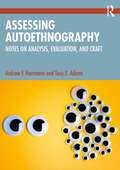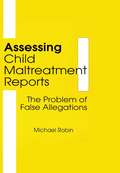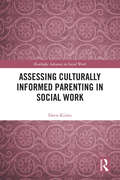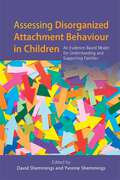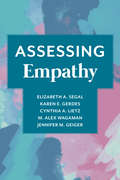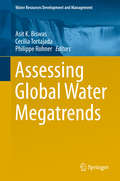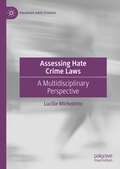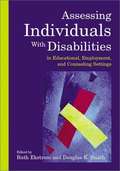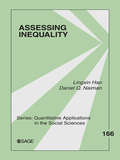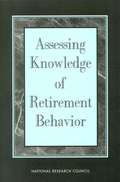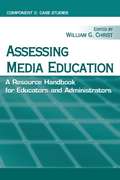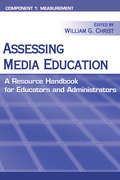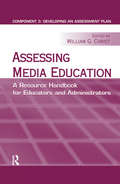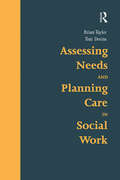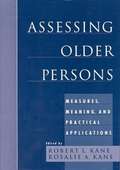- Table View
- List View
The Assertive Social Worker
by Patricia McBrideWould you like to feel more in control of yourself and your work? To cope comfortably with any demands the day throws at you? Deal easily with situations without guilt or worry? If so, this is the book for you! Social work is a stimulating and exciting career - but it can also be frustrating and exhausting. It’s easy to get so caught up in the challenges of work that it becomes difficult to see the wood from the trees. If only you were able to step back. The Assertive Social Worker will provide you with the tools to do just that and, as a result, will empower you to do your job better. By treating assertiveness as a set of skills which can be learned, practised and refined, the author opens the door to a way of thinking and behaving which can turn your whole life around. Although assertiveness may not traditionally have been associated with social work or the broader range of caring professions, it is based upon respect for yourself and others - a clear parallel with the underlying principles of your chosen career.
Assertiveness in the Context of Human Rights, Ethics, and Classical Virtues
by Connie Atristain-Suárez Susana Castaños-CervantesWhether in everyday disagreements, bargaining episodes, or high-stakes disputes, people typically see a spectrum of possible responses to dealing with differences with others, ranging from avoidance and accommodation to competition and aggression. When coming across such circumstances, it is crucial to advocate for oneself –our positions, to achieve personal goals, overcome difficulties, and be determined- but control aggressive impulses without harming the rights and interests of others. This book addresses assertiveness from a human rights perspective, using a mixed methods approach. It explores how assertiveness as a human right promotes human dignity and helps build more just, equitable, peaceful, and inclusive societies. With interdisciplinary contributors working in diverse fields, the collection brings together theoretical and applied research evidence on assertive rights. The collection examines assertive rights as critical factors for developing assertive behavior and as a virtue for personal development, empowerment, and thriving.
Assessing 21st Century Skills: Summary of a Workshop
by Judith Anderson KoenigThe routine jobs of yesterday are being replaced by technology and/or shipped off-shore. In their place, job categories that require knowledge management, abstract reasoning, and personal services seem to be growing. The modern workplace requires workers to have broad cognitive and affective skills. Often referred to as "21st century skills," these skills include being able to solve complex problems, to think critically about tasks, to effectively communicate with people from a variety of different cultures and using a variety of different techniques, to work in collaboration with others, to adapt to rapidly changing environments and conditions for performing tasks, to effectively manage one's work, and to acquire new skills and information on one's own. The National Research Council (NRC) has convened two prior workshops on the topic of 21st century skills. The first, held in 2007, was designed to examine research on the skills required for the 21st century workplace and the extent to which they are meaningfully different from earlier eras and require corresponding changes in educational experiences. The second workshop, held in 2009, was designed to explore demand for these types of skills, consider intersections between science education reform goals and 21st century skills, examine models of high-quality science instruction that may develop the skills, and consider science teacher readiness for 21st century skills. The third workshop was intended to delve more deeply into the topic of assessment. The goal for this workshop was to capitalize on the prior efforts and explore strategies for assessing the five skills identified earlier. The Committee on the Assessment of 21st Century Skills was asked to organize a workshop that reviewed the assessments and related research for each of the five skills identified at the previous workshops, with special attention to recent developments in technology-enabled assessment of critical thinking and problem-solving skills. In designing the workshop, the committee collapsed the five skills into three broad clusters as shown below: Cognitive skills: nonroutine problem solving, critical thinking, systems thinking Interpersonal skills: complex communication, social skills, team-work, cultural sensitivity, dealing with diversity Intrapersonal skills: self-management, time management, self-development, self-regulation, adaptability, executive functioning Assessing 21st Century Skills provides an integrated summary of the presentations and discussions from both parts of the third workshop.
Assessing Adoptive and Foster Parents: Improving Analysis and Understanding of Parenting Capacity
by Jon Baylin David Howe John Simmonds Daniel Hughes Joanne Alper Kim Golding Ben Gurney-SmithAssessing prospective adoptive and foster parents is an extremely complex task, and one that happens within a pressurised time frame. Currently, assessments draw substantially on interviews with prospective adopters and foster carers. Too often, they generate a lot of information but lack meaningful analysis and understanding of parenting capacity. Children with histories of trauma, loss and hurt need to join families in which parents exhibit the ability to be good at relationships, able to manage their own stress and bond with the child in their care. In this book, leading experts including Dan Hughes, Jonathan Baylin, Kim Golding and Julie Selwyn combine the latest findings from neuroscience with research on what makes good assessments. Together, they provide guidance and recommend tools for making thorough, analytical and effective assessments which will ensure the best possible chance of placement success. Assessing Adoptive and Foster Parents is an invaluable source of knowledge and practice guidance for social workers undertaking assessments of parenting capacity of children who have experienced neglect or trauma.
Assessing Adoptive Parents, Foster Carers and Kinship Carers, Second Edition: Improving Analysis and Understanding of Parenting Capacity
by Kim Golding Julie Selwyn Jon Baylin Joanne Alper David Howe Dan Hughes Ben Gurney-Smith Ailsa EdwardsAssessing prospective adoptive parents, foster carers, kinship carers and special guardians is an extremely complex task, and one that happens within a pressurized time frame. Currently, assessments draw substantially on interviews, which can generate a lot of information but little analysis to enable professionals to establish a meaningful understanding of parenting capacity. Children with histories of trauma, loss and hurt need to join families in which parents exhibit the ability to be good at relationships, are able to manage their own stress and bond with the child in their care. Now fully updated and expanded to cover the assessment of kinship carers and special guardians, this book combines the latest findings from neuroscience with research on what makes good assessments and provides guidance and tools for making thorough, analytical and effective assessments. With contributions from leading experts including Dan Hughes, Jonathan Baylin, Kim Golding and Julie Selwyn, it will provide you with the information you need to ensure the best possible chance of placement success.
Assessing Alternative Modifications to the Affordable Care Act: Impact on Individual Market Premiums and Insurance Coverage
by Christine Eibner Evan SaltzmanThis report summarizes analysis in which the COMPARE microsimulation model was used to estimate how several potential changes to the Affordable Care Act, including eliminating the individual mandate and eliminating the law’s tax-credit subsidies, might affect 2015 individual market premiums and overall insurance coverage. The report also presents estimate how changes in young adult enrollment might affect 2015 individual market premiums.
Assessing and Stimulating a Dialogical Self in Groups, Teams, Cultures, and Organizations
by Hubert HermansThis book presents 9 theory-based and practice-oriented methods for assessing and stimulating a multi-voiced dialogical self in the context of groups, teams, cultures, and organizations. All of these methods are based on Dialogical Self Theory. The book deals with the practical implications of this theory as applied in the areas of coaching, training, and counselling. A number of chapters focus on the process of positioning and dialogue on the level of the self, while other chapters combine self-processes with group work, and still others find their applications in leadership development and team-work in organizations. For each of the nine methods, the chapters present theory, method, case-study and discussions and make clear what kind of problems can be tackled using the method discussed. Specifically, the book discusses the following methods: A Negotiational Self Method for assessing and solving inner conflicts; a Self-Confrontation Method used to assess and stimulate personal meaning construction in career counselling; a Method of Expressive Writing in the context of career development; a Composition Method for studying the content and organization of personal positions via verbal and non-verbal procedures; a Dialogical Leadership Method that investigates and stimulates dialogical relationships between personal positions in the self of leaders in organizations; a Personal Position Repertoire Method that combines the assessment of personal positions with focus group discussions; a Team Confrontation Method for investigating collective and deviant positions or voices in organizational teams; a Method for Revising Organizational Stories with a focus on their emotional significance: and a Technique for Assessing and Stimulating Innovative Dialogue between Cultural Positions in global nomads.
Assessing and Treating Anxiety Disorders in Young Children: The Taming Sneaky Fears Program
by Suneeta Monga Diane BenoitThis book examines assessment and treatment methods for anxiety disorders in four- to- seven-year-olds. It discusses risk and protective factors in the preschool years, comorbidities, and how conditions such as separation anxiety disorder, social anxiety disorder, and selective mutism present in this age group. The book examines limitations of current definitions, assessment methods, and interventions. Chapters offer a theoretical framework from which to understand how traditional cognitive-behavior therapy (CBT) strategies can be used effectively in this age group. It offers a detailed description of the Taming Sneaky Fears program, an innovative, evidence-based group CBT program for four- to seven-year-old anxious children and their parents. It provides step-by-step instructions on how to implement Taming Sneaky Fears. The book concludes by addressing common challenges, influences, and outcomes for four- to seven-year-old anxious children and their families and provides recommendations for reducing the barriers to healthy development. Topics featured in this book include:Screening and assessment tools for young anxious children.Innovative assessment approaches for young anxious children.The use of Bravery Ladders to teach young children to overcome their fears and anxieties.Specific adaptations of the Taming Sneaky Fears program for selective mutism and social anxiety disorder. The pivotal role of parents in the success of the Taming Sneaky Fears program.Assessing and Treating Anxiety Disorders in Young Children is a must-have resource for researchers, clinicians and related professionals, and graduate students in child and school psychology, pediatrics, social work, and psychiatry.
Assessing and Treating Low Incidence/High Severity Psychological Disorders of Childhood
by Stefan C. Dombrowski Martin Mrazik Karen L. GischlarDuring the past several decades, interest in children's psychological disorders has grown steadily within the research community, resulting in a burgeoning knowledge base. The majority of the attention and funding, not surprisingly, has focused on the more prevalent and well-known conditions. Although this raises the odds that young people with more well-known disorders such as ADHD, autism, and learning disorders will receive much-needed professional assessment and intervention, children with less frequently encountered disorders may experience a higher risk of misdiagnosis and inappropriate treatment. Useful data has been scattered throughout the literature for severe-but-less-frequent childhood psychological disorders, including: fire setting; gender identity disorder; impulse control disorders (i.e., kleptomania, trichotillomania, intermittent explosive disorder); selective mutism; Munchausen by proxy; childhood schizophrenia; gang involvement; sexual offending; self-injurious behavior; and feral children. This concise volume offers up-to-date information on these conditions, which, though relatively rare, may have profound effect not only on the children themselves but also their families, friends, and the community at large. Coverage of each disorder is presented in an accessible format covering: Overview and history.Description and diagnostic classification, with proposed changes to the DSM-V.Etiology and theory.Assessment tools and interview protocols.Commonly used psychological and pharmacological treatment options.Current research issues and directions for future investigation. Assessing and Treating Low Incidence/High Severity Psychological Disorders of Childhood is a must-have reference for researchers, clinicians, practitioners, and graduate students in clinical child and school psychology, pediatrics, psychiatry, social work, school counseling, education, and public policy.
Assessing and Treating Pediatric Obesity in Neurodevelopmental Disorders
by Adelle M. CadieuxThis book reviews strategies for assessing and treating pediatric obesity in children with neurodevelopmental disorders (ND). It synthesizes empirical findings and clinical strategies to offer the latest knowledge in key areas, including risk factors, physical activity, nutrition, treatment planning, goal-setting, and engagement with patients. A four-stage treatment model presents clinical guidance in triaging treatment and tailoring interventions to children's changing medical, behavioral, emotional, and cognitive needs. The book complements current pediatric ND literature by presenting clear guidelines for integrating treatment for obesity into existing treatment of these young patients. Topics featured in this book include: The effect of neurodevelopmental disorders on the assessment of obesity in children. The impact of developmental delays on physical activities and health behaviors. Strategies for promoting weight management goals in pediatric ND. Suggestions on how to engage and support families and caregivers. The role of prevention in weight management within pediatric ND. Assessing and Treating Pediatric Obesity in Neurodevelopmental Disorders is a must-have resource for clinicians, scientist-practitioners, and related professionals as well as researchers, professors, and graduate students in clinical child and school psychology, public health, social work, pediatrics, occupational therapy, and nutrition.
Assessing Autoethnography: Notes on Analysis, Evaluation, and Craft
by Tony E. Adams Andrew F. HerrmannAssessing Autoethnography provides readers with multiple ways to analyze autoethnographies and other forms of personal narrative writing. Given the proliferation of such forms across academic contexts, the book offers a guide of what autoethnography is, why it matters, and how to do it.Taking each of the three parts of auto-, ethno-, and -graphy in detail, Herrmann, and Adams, provide criteria and points of discussion to ensure robust assessment of an autoethnographic work as a whole. Every chapter is accompanied with exemplars and considers issues such as ethics, storytelling, and good writing. The book discerns the kinds of personal experiences that often work best for autoethnographic projects and provide ways to evaluate fieldwork, interviews, and representations.Written by two experts in the field, Assessing Autoethnography offers guidance to scholars and dissertation advisors, across diverse disciplines, in producing autoethnographic work and utilizing autoethnographic methods. The book will be of interest to researchers in the fields of Communication Studies, Education, Sociology, Women’s and Gender Studies, Critical Race Studies, Mass Communication, English, and other related disciplines.
Assessing Child Maltreatment Reports: The Problem of False Allegations
by Jerome Beker Michael RobinThis seminal book in the literature of child protective services stimulates critical thinking and informed discussion for those professionals and educators concerned with the quality of children’s protective services. The first book of its kind to present scholarly reports on false allegations, Assessing Child Maltreatment Reports tackles the age-old problem of deciding which reports, verbal or written, represent truth and which represent falsehood. When one deals with accusations in the area of child maltreatment, special problems are posed. This vital resource brings home the complexity and seriousness of confronting the need to separate true reports from false reports. Given the serious consequences of reports of maltreatment, determining the accuracy or inaccuracy of such reports is of major critical importance to all concerned and the parents, children, and professionals directly involved. This book deals effectively and practically with the everyday work of assessing the validity and reliability of maltreatment reports and guides professionals through rough waters of finding truth with helpful research.This courageous book provides hope for establishing a deeper understanding of the broad system of child protection and consequently, enables professionals to better handle individual crises and cases. Containing a range of chapters--authored by leading academic researchers and practitioners in child welfare services in the United States--which examine the policy and practice issues related to false allegations of child abuse and neglect, this volume provides guideposts for further research and discussion. College and university students in child welfare and related programs, human service practitioners working in child protective and welfare services, and the larger public--both parents and professionals working with children--who have an interest in this important issue, will find Assessing Child Maltreatment Reports a compassionate approach to a sensitive issue.
Assessing Culturally Informed Parenting in Social Work (Routledge Advances in Social Work)
by Davis KiimaThis book explores how social workers incorporate issues of culture when evaluating the parenting competence of Black, Asian, and Minority Ethnic (BAME) parents and highlights the gap in how social workers assess safe parenting in BAME families. Drawing on a study that combined a phenomenological research philosophy with frame analysis, the book explores how culturally informed parenting is construed by social workers and BAME parents. It argues that effective assessment of the parenting competence of BAME parents is predicated on understanding how culture frames perspectives of what constitutes competent parenting. Throughout the eight chapters, the book moves the debate within the literature away from the universality of parenting concepts to a focus on a deeper understanding of culture. It highlights the influence that culture has on the way that BAME parents socialise their children, as well as how parents and social workers conceptualise safe parenting. The result is useful insights into the cultural context of parenting. The book will be of interest to all scholars and students of social work, childhood studies, sociology, and social policy, as well as social work professionals more broadly.
Assessing Disorganized Attachment Behaviour in Children: An Evidence-Based Model for Understanding and Supporting Families
by Mel Hamilton-Perry David Shemmings Michelle Thompson David Phillips Yvalia Febrer Henry Smith Alice Cook Yvonne Shemmings Jo George Fran Feeley David Wilkins Claire Denham Sonja Falck Tania YoungAssessing Disorganized Attachment Behaviour in Children lays out an evidence-based model for working with and assessing children with disorganized attachment and their adult carers: families whose extreme, erratic and disturbing behaviour can make them perplexing and frustrating to work with. The model is designed to identify key indicators and explanatory mechanisms of child maltreatment: disorganized attachment in the child, a parent's unresolved loss or trauma, disconnected and extremely insensitive parenting, and low parental mentalisation. The book also outlines ways of assessing children for disorganized attachment and carer capacity, and proposes interventions. Accessible and practical, this book is essential reading for child protection professionals.
Assessing Empathy
by Elizabeth Segal Karen Gerdes Cynthia Lietz M. Alex Wagaman Jennifer GeigerEmpathy is a widely used term, but it is also difficult to define. In recent years, the field of cognitive neuroscience has made impressive strides in identifying neural networks in the brain related to or triggered by empathy. Still, what exactly do we mean when we say that someone has—or lacks—empathy? How is empathy distinguished from sympathy or pity? And is society truly suffering from an "empathy deficit," as some experts have charged??In Assessing Empathy, Elizabeth A. Segal and colleagues marshal years of research to present a comprehensive definition of empathy, one that links neuroscientific evidence to human service practice. The book begins with a discussion of our current understanding of empathy in neurological, biological, and behavioral terms. The authors explain why empathy is important on both the individual and societal levels. They then introduce the concepts of interpersonal empathy and social empathy, and how these processes can interrelate or operate separately. Finally, they examine the weaknesses of extant empathy assessments before introducing three new, validated measures: the Empathy Assessment Index, the Social Empathy Index, and the Interpersonal and Social Empathy Index.
Assessing Global Water Megatrends (Water Resources Development and Management)
by Asit K. Biswas Cecilia Tortajada Philippe RohnerThis book highlights what are likely to be the future megatrends in the water sector and why and how they should be incorporated to improve water governance in the coming decades. In this first ever book on megatrends for the water sector, 22 leading world experts from different disciplines representing academia, business, government, national and international organisations discuss what the major megatrends of the future are and how they will radically change water governance in the coming decades.
Assessing Hate Crime Laws: A Multidisciplinary Perspective (Palgrave Hate Studies)
by Lucille MichelettoThis book offers a critical analysis of hate crime law using Italy as a case study. Employing a multidisciplinary approach, it develops an international framework for mapping hate crime laws onto the phenomenon of hate crime itself, allowing for better legislation to be drafted. It shows how this analytical tool may be used in practice by applying it to legislation in Italy, where Parliament recently dismissed a legislative proposal to extend hate crime law to sex, gender, sexual orientation, gender identity, and disability. The framework allows readers to critique the rationale behind hate crime laws and the effect of, or potential effect of, their implementation. This book ultimately seeks to answer to the question of how and whether States can legitimately introduce a harsher sentence for bias motivated crimes. It bridges interdisciplinary hate studies and more traditional legal analysis. It speaks to an international audience as well as to an audience with a specific interest in the Italian context.
Assessing Individuals with Disabilities in Educational, Employment, and Counseling Settings
by Ruth Ekstrom Douglas SmithThe book is divided into six parts. Part I covers legal, policy, and psychometric issues affecting all types of assessment. Part II covers testing accommodations, documentation, and score reporting. These two sections, as well as Part VI on additional sources of information, should be of interest to all assessment professionals. The remaining three parts focus on specific types of assessment, covering the assessment of people with disabilities in clinical and counseling settings, educational settings, and assessment for employment, certification, and licensing. (PsycINFO Database Record (c) 2004 APA, all rights reserved).
Assessing Inequality
by Lingxin Hao Daniel Q. NaimanProviding basic foundations for measuring inequality from the perspective of distributional propertiesThis monograpg reviews a set of widely used summary inequality measures, and the lesser known relative distribution method provides the basic rationale behind each measure and discusses their interconnections. It also introduces model-based decomposition of inequality over time using quantile regression. This approach enables researchers to estimate two different contributions to changes in inequality between two time points.Key FeaturesClear statistical explanations provide fundamental statistical basis for understanding the new modeling frameworkStraightforward empirical examples reinforce statistical knowledge and ready-to-use proceduresMultiple approaches to assessing inequality are introduced by starting with the basic distributional property and providing connections among approachesThis supplementary text is appropriate for any graduate-level, intermediate, or advanced statistics course across the social and behavioral sciences, as well as individual researchers.Learn more about "The Little Green Book" - QASS Series! Click Here
Assessing Knowledge of Retirement Behavior
by Panel on Retirement Income ModelingThis book brings together in one volume what researchers have learned about workers, employers, and retirees that is important for formulating retirement income policies. As the U.S. population ages, there is increasing uncertainty about the solvency of the Social Security and Medicare systems and the adequacy of private pensions to provide for people's retirement needs. The volume covers such critical behaviors as workers' decisions to retire, people's choices of saving over consumption, and employers' decisions about hiring older workers and providing pension and health care benefits. Also covered are trends in mortality, health status, and health care costs that are key to projecting the likely costs and effects of alternative retirement income security policies and a strategy for combining data and research knowledge into a policy modeling framework.
Assessing Media Education: A Resource Handbook for Educators and Administrators: Component 2: Case Studies (Routledge Communication Series)
by William G. ChristThis component of Assessing Media Education is intended for those who would like to know how other schools have grappled with implementing assessment initiatives, and who have used assessment to improve their programs.
Assessing Media Education: A Resource Handbook for Educators and Administrators: Component 1: Measurement (Routledge Communication Ser.)
by William G. ChristThe chapters included in this component of Assessing Media Education are intended for those who have already developed an assessment plan and identified key student learning outcomes, and who need more information on how to measure the outcomes both indirectly and directly.
Assessing Media Education: A Resource Handbook for Educators and Administrators: Component 3: Developing an Assessment Plan (Routledge Communication Ser.)
by William G. ChristThe chapters in this component of Assessing Media Education are valuable for those who need to know how to develop an assessment plan.
Assessing Needs and Planning Care in Social Work
by Brian Taylor Toni DevineThe assessment of needs and the process of planning care are central issues in modern social work practice. Skilled assessment of client needs and strengths is essential to effective planning and efficient provision of quality social work services including both counselling and personal care. The focus of this book is on the development of the skills required at each stage of the social work process: assessment, care planning, implementation and evaluation. Throughout the book a balance is maintained between the focus on client involvement and the role of the social worker in an agency. The latter part of the book addresses practical issues in developing new approaches to assessment and care planning: primary workers, individual support and managing change. Social work practitioners, managers and trainers and students on qualifying and pre-qualifying training will find this an invaluable aid to the development of sound and yet creative practice.
Assessing Older Persons: Measures, Meaning, and Practical Applications
by Robert L. Kane Rosalie A. KaneHow to assess function, health, emotion, cognition, and social well-being in older people.
